The Transformative Impact of Teachers on the Protagonists of 21st Century Coming-Of-Age Films
“You’re just a kid, you’re just beginning, and you’re smart.” – The Holdovers
Alexander Payne’s latest feature The Holdovers (2023), explores the relationship between a curmudgeonly classics teacher at an all-boys boarding school and the boy he chaperones over the Christmas break. It depicts a brilliant dynamic between teacher and pupil, from their initially contentious relationship to their eventual breaking down of barriers and feelings of empathy for their fellow man. Upon watching The Holdovers, it is hard not to reflect on the wider genre of coming-of-age films, and the ever-present but often overlooked teacher who impacts or guides the protagonist’s journey in some way. In a recent interview with The Telegraph, Paul Giamatti expressed “I play a teacher, my whole family, they’re teachers, all of them going back generations. Teachers are good people, gotta respect them. They do a good thing.”
Coming-of-age cinema explores the formative years of young people, and the reasoning behind their decisions and their mistakes in their journey to adulthood. They are innately relatable, capturing that essence of youth and anticipation for the future, and the seeming gravity of navigating school, parents and relationships. School is such an impactful period of most young lives, so it is justly expected that teachers do act as guides in the academic and emotional sense. Teachers play such a prominent part in young lives, providing structure and guidance, and showing care and patience. Teachers are often represented in film as having an innate ability to make a young person feel seen when they feel the world does not understand them. Even those who play a supporting role in the overarching plot, such as in Lady Bird and The Perks of Being a Wallflower for example, may say something to their student that encourages the protagonist to indulge in introspection during their transition into adulthood.
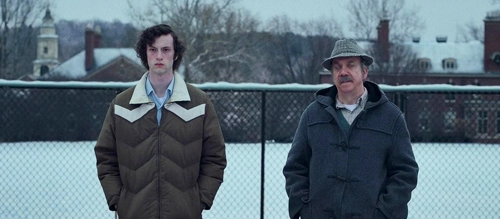
The Holdovers explores the idea of overcoming loneliness and the found family trope with exquisite tenderness. A quasi-father/son dynamic is depicted between teacher Mr Hunham (played by Payne’s long-term collaborator Paul Giamatti) and pupil Angus Tully (played by newcomer Dominic Sessa), as they uncover their similarities and form a strong bond. Throughout the film, Hunham receives an education of his own, as his presuppositions are challenged repeatedly. Particularly his disdain for Tully as a representation of the wealthy students who have “had it easy their whole lives”, which is contested when he discovers that Tully, like himself, is a scholarship student.
Tully and Hunham are both incredibly lonely outsiders, and they compliment each other and fulfil a need in each other’s lives. Tully has been abandoned by his mother, and lacks a father figure. Hunham gradually fills that absence, as he listens to him, guides him and stands up for him, essentially taking on the role of a parent. For Hunham, Tully breaks down his bitterness and disdain, and encourages him to let loose and enjoy himself, giving him purpose beyond appeasing the board who favour their wealthy donors’ children. They are vulnerable with each other, and discover and embrace their similarities. The most joyous moment of the film is Christmas Day, when Hunham finds a last-minute Christmas Tree and sets it up, and the two eat Christmas dinner together with the cafeteria manager Mary (played by the wonderful Da’Vine Joy Randolph). Here, Tully professes “I don’t think I’ve ever had a real family Christmas like this.”
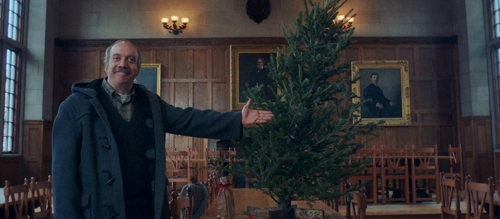
Woody Harrelson’s Mr Bruner in the The Edge of Seventeen (2016) possesses many similar traits to Giamatti’s character. He is unafraid to respond to the meltdowns of Hailee Steinfeld’s protagonist Nadine with brutal honesty, and she respects him for it. His (often shocking) humour helps her to ground herself and recognise that these are situations that feel massive as a young person but are in fact not world ending in the grand scheme of things. Edge of Seventeen’s Nadine and The Holdovers’ Angus Tully are similar in that they lack father figures. In Nadine’s case, after the death of her father she begins to look to Bruner as a guide. When all else seems to be falling apart, she goes to him for support, and he provides it. Though outwardly grouchy like Mr Hunham, Mr Bruner would also be the type to set up a last-minute Christmas if it meant that his student would feel cared for.
In contrast, Damien Chazelle’s Whiplash (2014) presents a more extreme, flawed and fractured dynamic between teacher and student. The dominating Fletcher (JK Simmons) is an intense and violent educator who is formative to young drummer Andrew’s (Miles Teller) experience at the fictional New York Schaffer Conservatory. Fletcher walks a fine line between being an excellent teacher and an abusive and detrimental individual, as he justifies “I was there to push people beyond what’s expected of them. I believe that’s an absolute necessity.” There is some deep-rooted sense in his reasoning, but his methods come at an immense cost to Andrew’s wellbeing. This is powerfully depicted when Andrew gets into a car crash on the way to a concert, regains consciousness, gets up out of the car and runs to his performance covered in blood and intent on not disappointing his mentor. Whiplash creates a very fascinating and dramatic dynamic between teacher and student, and it leaves us wondering whether Fletcher’s intentions were, in fact, beneficial to those striving to be the best.
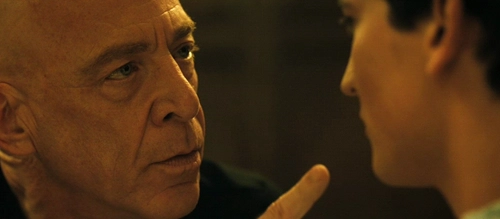
Though the characters referenced so far play a more major role in the plot of their respective films, the teachers who take the form of a much more minor supporting role can be just as impactful. The namesake of Lady Bird (2017), attends a Catholic school and has a bond with a nun, Sister Sarah Joan (Lois Smith). Lady Bird (Saoirse Ronan) has a classic teenage desire to reject her hometown and forge a new identity before college, separate from her life in Sacramento and in turn her mother.
Sister Sarah Joan has arguably one of the most important lines in the film. When reviewing a piece of school work Lady Bird has written about Sacramento, she says: “Don’t you think maybe they are the same thing? Love and attention.” Though her comment is about the piece of writing, for Lady Bird it is a sentiment that resonates with not only her desire to reject her hometown, but also address her strained relationship with her mother. Arguably, this moment of feeling seen by her teacher plays a part in Lady Bird’s call to her mother once she has moved to college in the final scene of the film, where she reminisces on her first drive around Sacramento. Her mother’s attentive, hypercritical nature is her form of love, just as Lady Bird’s criticisms of her hometown actually reflect an affection for it.
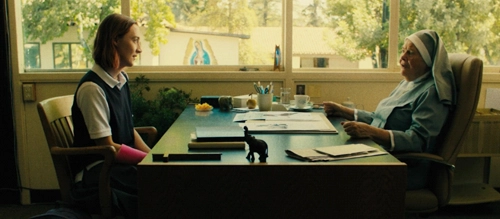
Teachers have an innate purpose to lift up their students, and put them on a path to success. Scenes with seemingly inconsequential moments, that perhaps these protagonists initially take for granted, can often be shown to have a huge impact on their trajectory.
In Boyhood (2014), a small moment between the protagonist, Mason (Ellar Coltrane) and his photography teacher (Tom McTigue) affects his outlook. The teacher expresses his frustration that Mason has so much natural talent in photography, yet isn’t putting in the work. The teacher leaves the sentiment with “[h]ey, maybe in 20 years you can call old Mr Turlington, and you can say “thank you, sir, for that terrific dark room chat we had that day”. This sentiment perfectly encapsulates the idea that teachers can give an often-overlooked piece of advice or guidance that can leave a lasting impression on a young person.
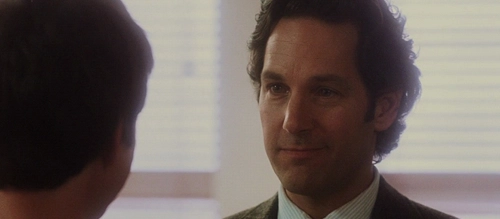
In The Perks of Being a Wallflower (2012), Charlie (Logan Lerman) is a young man starting high school late after traumatic events in his childhood held him back. He prefers to be a ‘wallflower’ and remain under the radar. However, his sweet English teacher Mr Anderson (Paul Rudd) quietly recognises his student’s love of reading and begins giving him extra work to do outside of class. He sees Charlie when no one else does, elevating him. One of the most poignant moments in their relationship is when Mr Anderson gives Charlie his own copy of his favourite book growing up, encouraging Charlie to accept the love he deserves rather than the love he thinks he deserves. There is something wonderful about the gifting of a book, it feels somewhat like an insight into the soul. From teacher to student, it is much more of a tool of guidance, emotional and academic. In The Holdovers, Mr Hunham gifts Tully a copy of “Meditations” by Marcus Aurelius, and though that book holds far less emotional value to Mr Hunham than Mr Anderson’s does, it perpetuates his belief that history is “an explanation of the present”, and he guides Tully to remember “if you truly want to understand the present or yourself, you must begin in the past.” There is such apparent thought behind the actions of these teachers presented in such small, careful and particular moments that you know they will leave the protagonists with a long-lasting impression.
Films have an innate ability to elevate the quiet characters, the heroes of the everyday, such as teachers, by portraying how small moments can inspire great change. Young people inhabiting the liminal space between childhood and adulthood in coming-of-age cinema would perpetually lack direction were it not for the teachers that so often arrive at the perfect moment to deliver gems of wisdom that enable that young person to feel seen. The Holdovers is a true diamond of a film in its depiction and appreciation of the impact of a Good Teacher, one who understands, who listens and who sees those that sit on the sidelines.
Written by Cat Searcey
You can support Cat Searcey via TikTok (@cat.s__) and Medium (blog).

